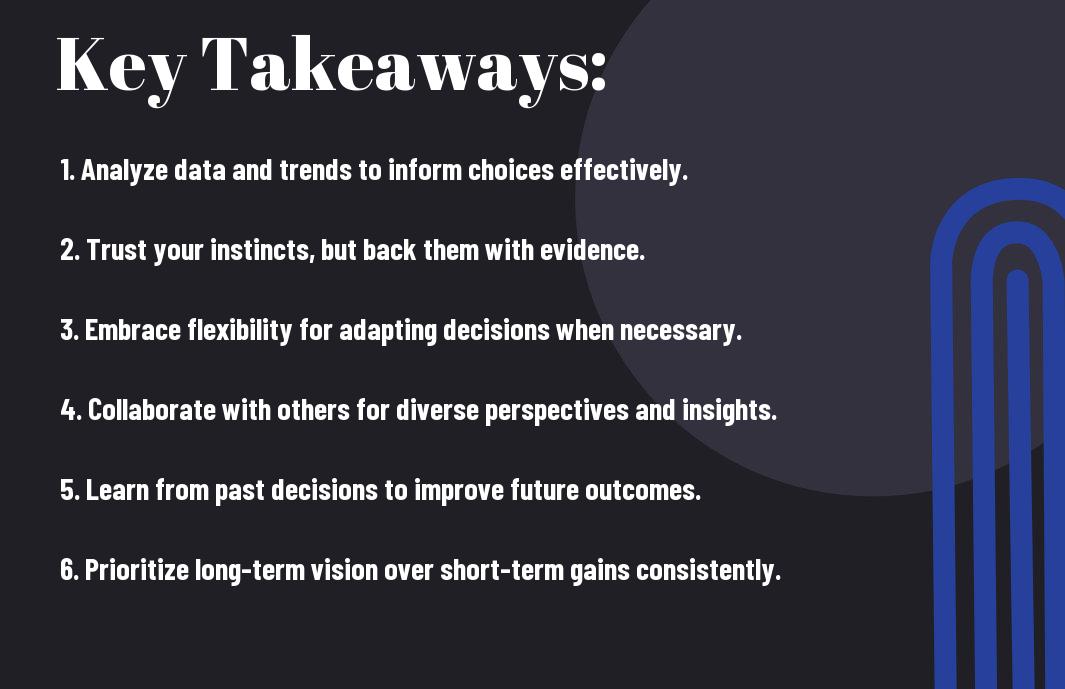
Most entrepreneurs face countless decisions each day, and your ability to make informed choices can significantly impact your business’s success. Developing strong decision-making skills not only enhances your problem-solving capabilities but also boosts your confidence as a leader. In this post, you will explore effective strategies and techniques that will help you refine your decision-making process, ensuring that your choices align with your goals and vision. By mastering this vital skill, you can navigate the complexities of entrepreneurship with greater ease and effectiveness.

Understanding Decision-Making
The ability to make informed decisions is a pivotal skill for you as an entrepreneur. Understanding how decisions are made allows you to navigate complex scenarios and seize opportunities with confidence. This chapter probes into the nuances of decision-making, providing insights that can enhance not only your business practices but also your personal growth. By grasping the underlying principles, you will develop a more structured approach to facing challenges in your entrepreneurial journey.
The Decision-Making Process
For effective decision-making, it is crucial to follow a structured process, which includes identifying the problem, gathering relevant information, weighing alternatives, making the choice, and reviewing the outcomes. Each step is designed to help you systematically evaluate your options and ensure a reasoned conclusion. By adhering to this framework, you can enhance your confidence and reduce the stress that often accompanies tough decisions.
Psychological Factors in Decision-Making
Against the backdrop of logic and analysis, psychological factors can heavily influence your decision-making. Emotions, biases, and past experiences often seep into the choices you make, potentially steering you off course. By acknowledging these influences, you can fortify your decision-making process. Key psychological factors include:
- Cognitive biases
- Emotional states
- Social influences
Thou should assess these factors carefully to empower your decision-making abilities.
Understanding the psychological aspects that affect decision-making can dramatically alter your approach to challenges. When you grasp how your mind works, you are better positioned to mitigate negative influences and leverage positive ones. A deep investigate these influences can help you recognize patterns that could lead to suboptimal choices. Consider the following factors:
- Anchoring bias
- Confirmation bias
- Error of optimism
Thou must reflect on these psychological dynamics to refine your decision-making strategy.
Information Gathering
Clearly, effective decision-making hinges on your ability to gather relevant information. As an entrepreneur, understanding the dynamics of your industry, market trends, and customer preferences is paramount. You must utilize various strategies to collect comprehensive and reliable data, allowing you to make informed choices that will foster growth and innovation in your business.
Research Techniques
Along your journey, employing a variety of research techniques can significantly enhance your information gathering process. You can utilize surveys, focus groups, and interviews to gain firsthand insights from your target audience. Exploring case studies and industry reports can also provide valuable context as you analyze the competition and overall market landscape.
Evaluating Sources of Information
Around every corner, there are countless sources of information available to support your entrepreneurial decisions. However, the accuracy and reliability of these sources can vary significantly, making it important for you to critically evaluate them. Assess the credibility of the author or organization, examine cited references, and analyze the date of publication to ensure you’re working with the most relevant and trustworthy information.
And, to further refine your evaluation process, consider the purpose and potential bias behind the information you encounter. Look for well-rounded viewpoints and cross-reference data with multiple sources to verify its authenticity. By applying these discerning techniques, you can build a solid foundation of knowledge, empowering you to make decisions guided by facts rather than assumptions.
Risk Assessment
Now, as an entrepreneur, effective decision-making hinges on your ability to assess risks accurately. Understanding the potential pitfalls in your business strategy enables you to make informed choices that align with your goals. By evaluating both the likelihood and impact of various risks, you can safeguard your ventures and optimize your path to success.
Identifying Potential Risks
For you to develop a robust risk assessment strategy, it’s imperative to identify potential risks that could affect your business. These risks can stem from various sources, including financial uncertainties, market fluctuations, operational challenges, and legal compliance. By pinpointing these factors early on, you can take proactive steps to mitigate their impact on your entrepreneurial journey.
Tools for Risk Analysis
Analysis of risks requires effective tools that enable you to quantify and assess the various uncertainties in your business environment. Utilizing risk matrices, SWOT analysis, and scenario planning can help you systematically evaluate risks and prioritize your responses. These tools empower you to create a structured approach to risk management, ensuring a comprehensive understanding of potential threats.
Risks associated with your business decisions can be effectively managed through various analytical tools. For instance, a risk matrix allows you to categorize risks based on their likelihood and impact, helping you prioritize which ones require immediate attention. SWOT analysis further enhances your strategy by identifying internal strengths and weaknesses alongside external opportunities and threats. Scenario planning enables you to envision different future situations, preparing you to navigate uncertainties with confidence. By incorporating these tools into your decision-making process, you fortify your business against potential setbacks and foster a proactive mindset.
Strategic Thinking
Keep in mind that strategic thinking is a cornerstone of effective decision-making. By honing your ability to assess situations, identify opportunities, and evaluate potential outcomes, you can make informed decisions that align with your overall vision. This skill enables you to anticipate challenges, adapt to changing environments, and ultimately drive your business forward.
Long-Term vs. Short-Term Decisions
At the intersection of strategic thinking lies the differentiation between long-term and short-term decisions. You will often be faced with choices that impact your business in varying timeframes. While short-term decisions tend to yield immediate results, weighing these against your long-term objectives is vital for sustainable growth.
Aligning Decisions with Business Goals
Around every decision you make, consider how it aligns with your overarching business goals. Ensuring that your choices support your mission and vision not only streamlines your decision-making process but also reinforces your brand identity. Consistency is key; aligning decisions with your goals cultivates trust and loyalty among your stakeholders.
Also, keeping your business goals at the forefront of your decision-making process helps you prioritize efforts effectively. When you evaluate the potential impact of a decision, envision how it drives you closer to your objectives. This approach prevents scattered efforts and focuses your resources, time, and energy on initiatives that genuinely advance your business. By consistently aligning your decisions with your goals, you establish a coherent strategy that fosters long-term success.
Tools and Techniques
Not all decision-making scenarios are straightforward. As an entrepreneur, you can transform ambiguity into actionable insights by employing a variety of tools and techniques. From analytical frameworks to hands-on technological solutions, these resources can enhance your decision-making process and ultimately guide your entrepreneurial journey. The ability to leverage these methods effectively will set you apart in today’s competitive landscape.
Decision-Making Frameworks
To streamline your decision-making process, you can rely on established frameworks such as SWOT analysis, the Eisenhower Matrix, or the Pareto Principle. Each of these tools provides structured approaches to evaluate options based on various criteria. By applying these frameworks, you’ll gain clarity and confidence in your choices, allowing you to focus on strategies that align with your business objectives.
Leveraging Technology in Decision-Making
Among the various strategies you can employ, technology offers you powerful tools to enhance your decision-making capabilities. Harnessing data analytics, visualization tools, and collaborative platforms can illuminate options and provide evidence-based insights, contributing to more informed decisions.
For instance, utilizing business intelligence software can help you analyze large datasets quickly, uncovering patterns and trends that may inform your choices. Additionally, project management tools can facilitate collaboration among team members, allowing for diverse perspectives to be considered before reaching a consensus. Embracing technology not only streamlines your process but also empowers you to make decisions that are backed by real-time data and shared insights.
Learning from Experience
After every decision you make, it’s vital to evaluate the outcome to enhance your future decision-making skills. Experience is one of your greatest teachers; the more you reflect on what went right or wrong, the better equipped you become to navigate similar situations again. Each choice builds a foundation for your strategic thinking, helping you to recognize patterns and avoid past mistakes.
Post-Decision Reflection
From reflecting on your decisions, you gain valuable insights into your thought processes and the results they yield. This analysis is not about self-critique, but rather about understanding how your decisions align with your goals. By regularly engaging in this practice, you empower yourself to make informed adjustments, ensuring that each new decision is influenced by your growing knowledge and experience.
Adapting Future Decisions Based on Past Outcomes
Behind every successful entrepreneur lies a history of decisions that have shaped their journey. By analyzing past outcomes, you can spot trends, understand your strengths and weaknesses, and refine your approach to future challenges. Each experience offers lessons that can significantly impact your decision-making framework.
Reflection on previous decisions can guide your instinctual responses to future challenges. By identifying which strategies yielded success and which did not, you start to form a personalized decision-making blueprint. This allows you to pivot quickly when faced with new opportunities. Each analysis not only informs your future choices but also builds your confidence as an entrepreneur, as you learn to trust your judgment based on empirical data and past experiences.
Summing up
Taking this into account, mastering the art of decision-making as an entrepreneur is important for your success. By combining analytical thinking with intuition, seeking diverse perspectives, and learning from past experiences, you can enhance your ability to make informed choices. Embrace a proactive mindset and develop strategies to evaluate risks and opportunities effectively. Ultimately, these skills will empower you to navigate challenges and lead your business toward sustainable growth.
Leave a Reply